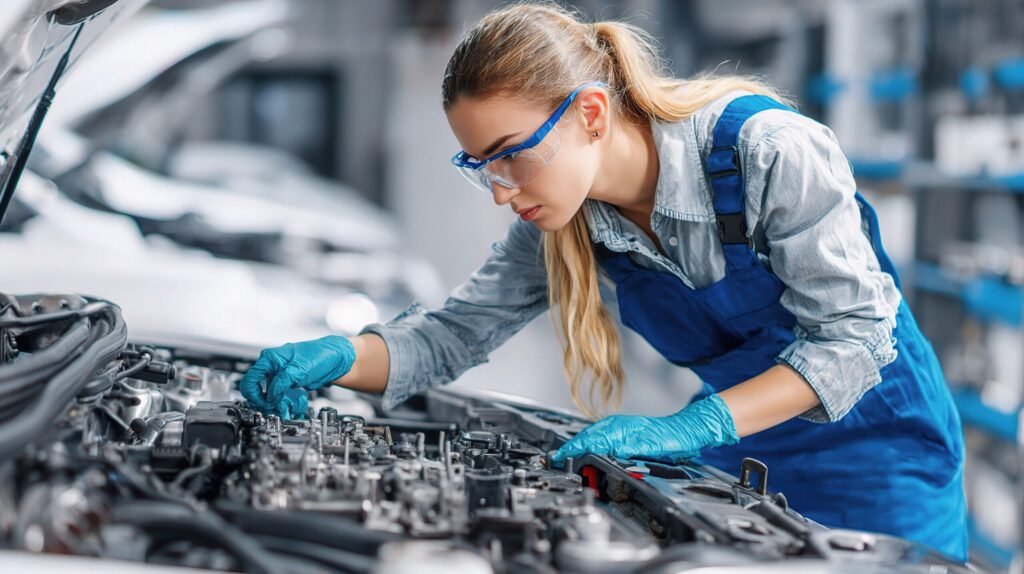As the world shifts towards eco-friendly transportation, the demand for skilled electric vehicle technicians is on the rise. Becoming an electrical car mechanic not only opens up new career opportunities but also allows you to be part of a sustainable future.

You are taking the first step by exploring this profession. Our guide will walk you through the necessary steps to become proficient in eco-friendly auto repair. From understanding the basics of electric vehicles to acquiring the specialized skills required for the job, we will cover it all.
Key Takeaways
- Understand the role of an electrical car mechanic
- Learn about the growing demand for electric vehicle technicians
- Discover the steps to become an eco-friendly auto repair specialist
- Explore the skills required for the job
- Find out how to start your career in this field
The Growing Demand for Electrical Car Mechanics
The growing popularity of electric vehicles is driving a significant demand for skilled electrical car mechanics. As the automotive industry continues to evolve, the need for professionals with expertise in electric car repair services and electric vehicle diagnostics is becoming increasingly important.
Current Market Trends in Electric Vehicles
The electric vehicle market is experiencing rapid growth, driven by environmental concerns and advancements in technology. As a result, hybrid car mechanics are also in high demand, as they possess the skills to work on both conventional and electric vehicles. The current market trends indicate a shift towards more sustainable and environmentally friendly transportation options.
Why Now Is the Perfect Time to Enter This Field
Now is an ideal time to pursue a career as an electrical car mechanic due to the increasing demand for electric car repair services. With governments worldwide implementing policies to encourage the adoption of electric vehicles, the industry is poised for continued growth. By entering this field, you can capitalize on the opportunities presented by this trend and build a rewarding career.
As the demand for electric vehicles continues to rise, the need for skilled technicians who can diagnose and repair these vehicles will only continue to grow. By acquiring the necessary skills and training, you can position yourself at the forefront of this exciting and rapidly evolving industry.
Essential Education and Training Requirements
The path to a successful career as an electrical car mechanic involves comprehensive training and education. As the demand for electric vehicles (EVs) continues to grow, the need for skilled technicians who can service and repair these vehicles is becoming increasingly important.
High School Preparation and Prerequisites
Your journey to becoming an electrical car mechanic can start in high school. Courses in automotive repair, electronics, and mathematics provide a solid foundation. It’s also beneficial to have a strong understanding of computer systems and programming, as modern EVs rely heavily on sophisticated software.
Technical School and College Programs
After high school, enrolling in a technical school or college program that specializes in EV maintenance is a crucial step. These programs typically cover a wide range of topics, from basic electrical principles to advanced diagnostics and repair techniques.
Recommended Courses and Specializations
When selecting a program, look for courses that focus on EV-specific training, such as battery management systems, electric motor repair, and high-voltage safety procedures. Specializing in a particular EV manufacturer can also be advantageous.
Online vs. In-Person Training Options
Both online and in-person training options are available for aspiring EV technicians. While online courses offer flexibility, in-person training provides hands-on experience, which is invaluable in this field. A combination of both can be an ideal approach.
Manufacturer-Specific Training Opportunities
Many EV manufacturers, such as Tesla, Nissan, and Chevrolet, offer specialized training programs for technicians. These programs can provide deep insights into the specific technologies used by each manufacturer, making you a more competitive job candidate.
By focusing on these educational and training requirements, you can position yourself as a skilled ev maintenance specialist ready to work in an ev auto shop or as an electric car technician.
Core Skills Needed to Succeed as an Electrical Car Mechanic
To excel as an electrical car mechanic, you must possess a specific set of skills that cater to the unique demands of electric vehicles. The shift towards electric vehicles (EVs) has created a high demand for technicians who are not only knowledgeable about EV systems but also skilled in handling high-voltage equipment safely.
Understanding EV Battery Systems and Management
A crucial skill for any electrical car mechanic is understanding EV battery systems and management. This includes knowledge of battery types, charging systems, and battery management systems (BMS). For instance, a well-versed technician should be able to diagnose issues related to battery health and performance.
As noted by an industry expert, “The battery is the heart of an electric vehicle, and understanding its intricacies is vital for effective diagnosis and repair.”
“The complexity of EV batteries requires a deep understanding of electrochemistry, thermal management, and safety protocols.”
Electric Motor and Drivetrain Expertise
Another essential skill is expertise in electric motor and drivetrain technology. This involves understanding the different types of electric motors used in EVs, such as induction motors and permanent magnet motors, and being able to diagnose and repair drivetrain components.
| Skill | Description | Importance Level |
|---|---|---|
| EV Battery Knowledge | Understanding battery systems, charging, and BMS | High |
| Electric Motor Expertise | Knowledge of electric motor types and drivetrain repair | High |
| High-Voltage Safety | Procedures for safe handling of high-voltage systems | Critical |
| Diagnostic Skills | Ability to diagnose complex EV issues | High |
High-Voltage Safety and Handling Procedures
Safety is paramount when working with electric vehicles, particularly when dealing with high-voltage systems. Technicians must be trained in high-voltage safety procedures to prevent electrical shock and other hazards. This includes understanding personal protective equipment (PPE) and safe work practices.
Diagnostic and Troubleshooting Skills
Effective diagnostic and troubleshooting skills are critical for an electrical car mechanic. This involves using specialized diagnostic equipment and software to identify and repair complex issues in EV systems. Technicians must be able to interpret diagnostic trouble codes and perform repairs efficiently.
By mastering these core skills, you can position yourself for success as an electrical car mechanic in a rapidly evolving industry.
Certification and Licensing for EV Technicians
As the demand for electric vehicles grows, so does the need for certified EV technicians. To work on these advanced vehicles, you need to obtain the right certifications, which not only enhance your skills but also boost your credibility in the industry.
ASE Electric Vehicle Certifications
The ASE (Automotive Service Excellence) offers specialized certifications for EV technicians. These certifications cover a range of topics, including EV battery systems and high-voltage safety procedures. By obtaining an ASE certification, you demonstrate your expertise and commitment to providing high-quality electric car repair services.

Manufacturer-Specific Certifications
Many EV manufacturers, such as Tesla, Nissan, and Chevrolet, offer their own certification programs. These programs are designed to ensure that technicians are familiar with the specific technologies and systems used in their vehicles. By getting certified by these manufacturers, you can increase your job prospects and potentially earn higher salaries as an ev maintenance specialist.
Required Safety Certifications and Credentials
Safety is paramount when working with electric vehicles. To ensure you’re equipped to handle the unique safety challenges of EVs, you should obtain safety certifications. These certifications cover topics like high-voltage safety and proper handling procedures. As a hybrid car mechanic, having these credentials not only enhances your safety but also your ability to work effectively on a variety of vehicles.
In conclusion, obtaining the right certifications is a critical step in your career as an EV technician. By focusing on ASE certifications, manufacturer-specific training, and safety credentials, you can position yourself for success in this rapidly growing field.
Essential Tools and Equipment for Electrical Car Repair
As an aspiring electric car technician, you’ll need the right tools and equipment to diagnose and repair electric vehicles (EVs) efficiently. Working on EVs requires a distinct set of tools that are designed to handle their unique electrical systems.
Specialized Diagnostic Equipment and Software
To effectively diagnose issues with electric vehicles, you’ll need specialized diagnostic equipment and software. This includes tools like battery testers, electrical system analyzers, and manufacturer-specific diagnostic software. For instance, Tesla technicians use Tesla’s proprietary diagnostic tools to troubleshoot issues with Tesla models.
Some of the key diagnostic equipment includes:
- Battery testers to evaluate the health and performance of EV batteries
- Electrical system analyzers to diagnose issues with the electrical system
- Manufacturer-specific diagnostic software to access vehicle-specific data
Safety Equipment and Insulated Tools
Safety is paramount when working with electric vehicles, as they involve high-voltage systems. To ensure your safety, you’ll need safety equipment and insulated tools. This includes insulated gloves, safety glasses, and voltage-rated tools that can protect you from electrical shock.
Workshop Setup Requirements and Considerations
Setting up an eco-friendly auto repair workshop for electric vehicles requires careful consideration of several factors, including ventilation, electrical infrastructure, and safety protocols. Your workshop should be equipped with proper ventilation systems to remove any hazardous fumes or particles, and the electrical infrastructure should be capable of supporting the high-voltage systems of EVs.
| Workshop Requirement | Description | Importance Level |
|---|---|---|
| Proper Ventilation | Removes hazardous fumes and particles | High |
| Electrical Infrastructure | Supports high-voltage EV systems | High |
| Safety Protocols | Ensures technician safety during repairs | Critical |
Career Paths and Job Opportunities
As an aspiring electrical car mechanic, you’re entering a field with diverse career paths. The growing demand for electric vehicles (EVs) has created a wide range of job opportunities for skilled technicians. Whether you’re interested in working for a dealership, an independent repair shop, or starting your own business, the options are vast.
Dealership vs. Independent Shop Employment
Working as an electrical car mechanic in a dealership setting provides the stability of a steady income and the benefit of manufacturer-specific training. On the other hand, independent shops offer flexibility and the potential for higher earnings through bonuses or profit-sharing models. “The choice between dealership and independent shop employment depends on your personal preferences and career goals,” says an industry expert.
Salary Expectations and Growth Potential
The salary for electric vehicle technicians varies based on location, experience, and employer. However, with the increasing demand for EV repair services, there’s significant potential for career growth and salary increases. Technicians who specialize in high-demand brands or acquire additional certifications can further enhance their earning potential.
Transitioning from Traditional to Electric Vehicle Repair
For mechanics experienced in traditional gasoline-powered vehicles, transitioning to electric car repair services requires additional training but offers a competitive edge. Manufacturers often provide training programs for technicians to learn about their EV models, making it easier to transition into this growing field.
Conclusion: Your Journey to Becoming an Electrical Car Mechanic
As the automotive industry continues to shift towards electric vehicles, the demand for skilled electrical car mechanics is on the rise. By following the steps outlined in this guide, you can position yourself for success in this exciting and rapidly evolving field. Whether you’re interested in becoming an ev maintenance specialist, a hybrid car mechanic, or specializing in electric vehicle diagnostics, the opportunities are vast and varied.
You now have a comprehensive understanding of the education, training, and skills required to excel as an electrical car mechanic. With the right certifications, tools, and expertise, you’ll be well-equipped to tackle the challenges of modern electric vehicles. Take the first step towards a rewarding career by exploring training programs and manufacturer-specific opportunities that align with your goals.
As you embark on this journey, remember that staying up-to-date with the latest technologies and techniques is crucial. The field of electric vehicles is constantly evolving, and ongoing education will be key to your long-term success. By dedicating yourself to this field, you’ll not only be contributing to a more sustainable future but also positioning yourself for a fulfilling and lucrative career.
FAQ
What is the average salary of an electrical car mechanic?
The average salary of an electrical car mechanic can vary depending on factors like location, experience, and employer. However, according to the Bureau of Labor Statistics, the median annual salary for automotive technicians, including those who work on electric vehicles, was around $44,050 in May 2020.
Do I need to be certified to work as an electrical car mechanic?
While certification is not always mandatory, having it can significantly improve job prospects. The National Institute for Automotive Service Excellence (ASE) offers certifications for electric vehicle technicians, and some manufacturers, like Tesla, also provide their own certification programs.
What kind of training do I need to become an electrical car mechanic?
To become an electrical car mechanic, you’ll typically need to complete a training program in automotive repair, with a focus on electric vehicles. This can be done through a technical school or college, and some manufacturers also offer specialized training programs.
How long does it take to become an electrical car mechanic?
The time it takes to become an electrical car mechanic can vary depending on the training program and the individual’s prior experience. Typically, a certificate or diploma program in automotive repair can take around 6-12 months to complete, while an associate’s degree can take 2 years.
What are the most important skills for an electrical car mechanic to have?
Some of the most important skills for an electrical car mechanic include understanding EV battery systems and management, electric motor and drivetrain expertise, high-voltage safety and handling procedures, and diagnostic and troubleshooting skills.
Can I transition from being a traditional auto mechanic to an electrical car mechanic?
Yes, many traditional auto mechanics have successfully transitioned to working on electric vehicles. You’ll typically need to undergo additional training and certification to work on EVs, but your existing knowledge and experience can be a solid foundation.
What kind of tools and equipment do I need to work on electric vehicles?
To work on electric vehicles, you’ll need specialized diagnostic equipment and software, as well as safety equipment like insulated tools and personal protective gear. You’ll also need a well-equipped workshop with proper ventilation and safety features.
Are there job opportunities available for electrical car mechanics?
Yes, the demand for electrical car mechanics is growing rapidly as the adoption of electric vehicles increases. You can find job opportunities at dealerships, independent repair shops, and specialty EV repair facilities.




